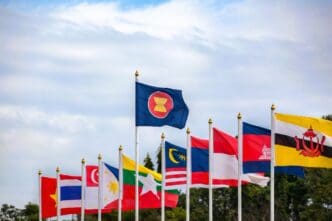WASHINGTON D.C. – The Trump administration’s imposition of steep, country-specific tariffs on several Southeast Asian nations is sending shockwaves through the Association of Southeast Asian Nations (ASEAN), severely testing the bloc’s unity and raising fears of widespread economic instability. The new protectionist measures threaten to pit member states against one another, challenging the 58-year-old organization’s core principles of cooperation.

Earlier this year, the administration announced a series of targeted import taxes that vary significantly by country. According to reports, Cambodia faces a 49% tariff, Vietnam 46%, Thailand 36%, Indonesia 32%, and Malaysia 24%. While designed to pressure these export-driven economies, the tariffs are also predicted to trigger inflationary pressures within the United States and globally.
Global Trade Disruptions: US Tariffs on ASEAN
U.S. Tariff Rates on ASEAN Nations (April 2025)
The varied rates are expected to fuel intense competition among ASEAN members with similar manufacturing bases. Nations like Malaysia, Thailand, and Vietnam, which are all major exporters of electronics and machinery to the U.S., will now find their success dependent more on negotiated tariff rates than on production efficiency. This dynamic risks unraveling decades of regional economic integration.
These trade pressures are compounding pre-existing geopolitical fissures within the ten-member bloc. ASEAN is already navigating a complex landscape that includes the U.S.-China rivalry, territorial disputes in the South China Sea, and the ongoing civil war in Myanmar. The tariffs are likely to exacerbate these divisions, as member states’ responses are shaped by their divergent strategic interests. For example, the Philippines relies heavily on U.S. security support against China, while neighboring Laos maintains deep economic ties with Beijing.
In response, ASEAN leaders have emphasized the need for a unified front and a renewed focus on intra-regional trade. The bloc issued a joint statement warning that the tariffs will have a major impact on trade and stability, calling for “enhanced regional unity and cooperation.” At a recent summit, Malaysian Prime Minister Anwar Ibrahim confirmed he had written to President Trump to request a U.S.-ASEAN meeting to discuss the matter.
Economists and regional experts suggest that strengthening the ASEAN Economic Community (AEC) and prioritizing trade agreements like the Regional Comprehensive Economic Partnership (RCEP) could help mitigate the impact of U.S. tariffs. However, without a cohesive strategy, ASEAN risks losing its influence on both the regional and global stages, making the coming months a critical test of its relevance and resilience.








